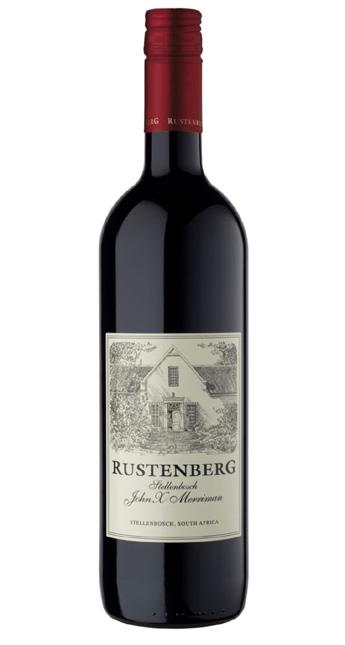
5 minute read
A claret from Stellenbosch
Sebastian Morello enjoys Rustenberg John X. Merriman
Eating meat from an animal one has killed and prepared oneself, carries with it a strange imperative—one hard to explain but which nonetheless seems obvious—to take the meal seriously. Such was my recent experience when sitting down with my family to enjoy the muntjac haunch that I’d spent the afternoon slow cooking in beef stock and juniper berries, and served with long-stem broccoli, roast potatoes, and Yorkshire puddings.
This wasn’t meat that had emerged from behind plastic packaging; it had once belonged to a free and wild creature that I’d looked in the face, and whose life and death were accordingly real to me in a way no supermarket flesh can be.
A part of the seriousness which accompanied that meal was found in carefully choosing the wine. Now, given that I am planning to embark on a hunting trip after springbok and kudu in South Africa next year, I thought it wise to treat our dinner of venison and veg as a preparation for more exotic tastes to come, and so I selected a bottle from one of my favourite wine regions in the world, South Africa’s Stellenbosch region, the wine being Rustenberg John X. Merriman, 2019.
As with so many Stellenbosch wines, the Rustenberg Merriman is a traditional claret blend, comprising Merlot, Cabernet Sauvignon, Malbec, and Petit Verdot, which is cask matured for twenty months. My local Majestic informs me that on drinking the wine—which if opened before its time, must be decanted—one should anticipate flavours of “cassis, cherry, mint, and cigar box,” whatever that’s supposed to mean. In truth, on opening the bottle just expect the kind of dark, rich, complex, full-bodied, longfinished red wine that typically comes from this region. Rustenberg Merriman is a very high-quality wine for a non-vintage, but it’s heavy, and it will hit you in the back of the throat, and thus will likely benefit from being accompanied by gamey meat or a block of stilton on crusty sourdough.

The wine is of course named after John Xavier Merriman (1841-1926), the last Prime Minister of the Cape Colony. The wine honours him chiefly because he was himself a successful wine producer in Stellenbosch, purchasing there a farm which eventually became Rustenberg Wines. Merriman is, however, also famous for his opposition to the Boer War, his challenging of the corrupt business practices of Cecil Rhodes, and his support for the multi-racial franchise in the Cape Colony — insisting that qualifications for voting at parliamentary elections had to be applied equally to all men regardless of race. The Cape Colony, where the vast majority of Southern Africa’s Catholics lived, became an exemplar for race relations throughout the land.
Very sad it is, then, that today South Africa appears to be going down the same path as did Zimbabwe, with ongoing political mayhem and a failing economy. The Afrikaner community, descendants of northern European farmers who courageously arrived in the 1650s to till the inhospitable landscape and transform it into a stable source of food, is under threat of being eradicated. Official data tell us that since 1994, close to 3,000 farmers have been murdered in what amounts to thousands of farm attacks, and this figure is considered by many to be a dramatic underestimation of a problem that seems to be intensifying every year. Many farmers of European heritage have applied for asylum in commonwealth countries, on the grounds that they believe they have become targeted due to being an ethnic minority in the country. Many report that their asylum requests were straightforwardly denied. Catholic history is thin in South Africa, and the Catholic population remains small. Nonetheless, the country gave us the important Catholic poet and acquaintance of Tolkien, Roy Campbell. South Africa also gave the Church the modern martyr, Blessed Benedict Daswa, a headmaster who was beaten to death on 2 February, 1990, for refusing to join a hysterical mob who were looking for a witch to lynch, insisting that his Catholic faith prevented him from acting on superstition.
If South Africa continues to fall apart, and racial tensions increase, not only will the Church’s presence in the country hugely suffer—especially as most Catholics there are descendants of Irish workers who arrived in the 19th century—but it will also likely lose one of its great gifts to the world: its wine. The viticulture of South Africa, for which the country is now universally admired in the wine world, was a creation of European settlers. It is simply impossible to see how South Africa will continue to enjoy its role as a major player in the world’s wine trade if attacks on agricultural families continue. Let us pray, then, that through some miracle these attacks come to an end, that the farming people of South Africa may be left in peace, and we can all enjoy the country’s wonderful wines for many years to come.










